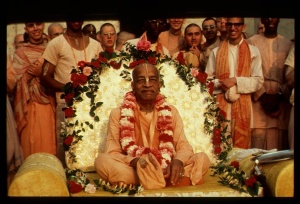SB 11.22.19: Difference between revisions
No edit summary |
(Vanibot #0054 edit - transform synonyms into clickable links, which search similar occurrences) |
||
| Line 23: | Line 23: | ||
<div class="synonyms"> | <div class="synonyms"> | ||
''[//vanipedia.org/wiki/Special:VaniSearch?s=sapta&tab=syno_o&ds=1 sapta]'' — seven; ''[//vanipedia.org/wiki/Special:VaniSearch?s=eva&tab=syno_o&ds=1 eva]'' — indeed; ''[//vanipedia.org/wiki/Special:VaniSearch?s=dhātavaḥ&tab=syno_o&ds=1 dhātavaḥ]'' — elements; ''[//vanipedia.org/wiki/Special:VaniSearch?s=iti&tab=syno_o&ds=1 iti]'' — thus saying; ''[//vanipedia.org/wiki/Special:VaniSearch?s=tatra&tab=syno_o&ds=1 tatra]'' — therein; ''[//vanipedia.org/wiki/Special:VaniSearch?s=arthāḥ&tab=syno_o&ds=1 arthāḥ]'' — the physical elements; ''[//vanipedia.org/wiki/Special:VaniSearch?s=pañca&tab=syno_o&ds=1 pañca]'' — five; ''[//vanipedia.org/wiki/Special:VaniSearch?s=kha&tab=syno_o&ds=1 kha]-[//vanipedia.org/wiki/Special:VaniSearch?s=ādayaḥ&tab=syno_o&ds=1 ādayaḥ]'' — beginning with ether; ''[//vanipedia.org/wiki/Special:VaniSearch?s=jñānam&tab=syno_o&ds=1 jñānam]'' — the spirit soul, who is the possessor of knowledge; ''[//vanipedia.org/wiki/Special:VaniSearch?s=ātmā&tab=syno_o&ds=1 ātmā]'' — the Supreme Soul; ''[//vanipedia.org/wiki/Special:VaniSearch?s=ubhaya&tab=syno_o&ds=1 ubhaya]'' — of both (the seen nature and the ''jīva'' who is its seer); ''[//vanipedia.org/wiki/Special:VaniSearch?s=ādhāraḥ&tab=syno_o&ds=1 ādhāraḥ]'' — the fundamental basis; ''[//vanipedia.org/wiki/Special:VaniSearch?s=tataḥ&tab=syno_o&ds=1 tataḥ]'' — from these; ''[//vanipedia.org/wiki/Special:VaniSearch?s=deha&tab=syno_o&ds=1 deha]'' — the body; ''[//vanipedia.org/wiki/Special:VaniSearch?s=indriya&tab=syno_o&ds=1 indriya]'' — senses; ''[//vanipedia.org/wiki/Special:VaniSearch?s=asavaḥ&tab=syno_o&ds=1 asavaḥ]'' — and vital airs. | |||
</div> | </div> | ||
Latest revision as of 20:33, 17 February 2024

A.C. Bhaktivedanta Swami Prabhupada
Please note: The synonyms, translation and purport of this verse were composed by disciples of Śrīla Prabhupāda
TEXT 19
- saptaiva dhātava iti
- tatrārthāḥ pañca khādayaḥ
- jñānam ātmobhayādhāras
- tato dehendriyāsavaḥ
SYNONYMS
sapta — seven; eva — indeed; dhātavaḥ — elements; iti — thus saying; tatra — therein; arthāḥ — the physical elements; pañca — five; kha-ādayaḥ — beginning with ether; jñānam — the spirit soul, who is the possessor of knowledge; ātmā — the Supreme Soul; ubhaya — of both (the seen nature and the jīva who is its seer); ādhāraḥ — the fundamental basis; tataḥ — from these; deha — the body; indriya — senses; asavaḥ — and vital airs.
Translation and purport composed by disciples of Śrīla Prabhupāda
TRANSLATION
According to some philosophers there are seven elements, namely earth, water, fire, air and ether, along with the conscious spirit soul and the Supreme Soul, who is the basis of both the material elements and the ordinary spirit soul. According to this theory, the body, senses, life air and all material phenomena are produced from these seven elements.
PURPORT
Having explained His own viewpoint, the Lord now summarizes various other analytic methodologies.